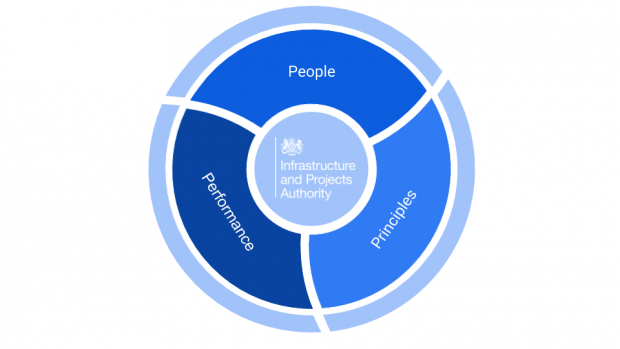The vast ambition and scale of projects and programmes currently being delivered across Government is truly impressive; from transforming vital public services, to building infrastructure across the country. Through our major projects we are delivering the Government’s policy priorities everyday, including preparing the UK to leave the EU.
With more commitments on the horizon and more projects yet to come, it cannot be denied that we are facing a challenging time. From my short time in Government so far, it is clear to see that the IPA has a crucial and unique view at the centre to help tackle these challenges head on and drive both improved value for money and public services for citizens.
As the Government’s centre of expertise for project, portfolio and programme management, I believe it is crucial we focus on the 3 ‘P’s: People, Performance and Principles.

It is essential to deliver real system-wide reform that we target on all three fronts. By focusing on these three elements in the ways I outline below, we will ultimately support the delivery of IPA’s vision is to create the best performing projects system in the world.
People: The foundation upon which all project delivery is built
This extraordinary period in government calls for extraordinary people.
The need for project and portfolio management excellence at the heart of public policy delivery has never been more vital. I know that the IPA has always championed getting the right people to work on the right projects. That is because we must ensure we have the most experienced leaders delivering our most complex projects and assessed against key competencies. To this aim, over 1,500 of the 12,500 project professionals in Government have been already trained through our leadership programmes. But we must do more.
We now need to look to the teams who surround those leaders. We must recognise that it is only by having our leaders surrounded by the right people that we can deliver the desired outcomes.
A project can’t be delivered by just one person. We need to build strong, flexible, professional and capable teams.

As we approach 2020, there will be new challenges for which we need new capabilities to be able to meet. For example, in order to reach NetZero by 2050 we will not only have to begin new projects but the change will also affect the entire supply chain with the rapid adoption of new technologies.
We are already seeing the impact of technology on our major projects and we need to adapt to keep pace. We are seeing this on projects such as Crossrail where the project has a greater focus on - and challenges with - systems and technology than just traditional civils.
In order for us to work effectively with these new technologies, the Profession needs to be more flexible, have a broader toolkit and more diverse skillset. For this reason we will be strengthening functional standards; as well as establishing a new project academy and accreditation to grow and retain talent in government.
Currently between 70% and 80% of Project Directors and Senior Responsible Owners across Government are male. Our long term ambition is to ensure that the leadership of our major projects are fully representative of the working population as a whole.
We have a great platform to build on, each year a new cohort of around 70 fast streamers joins, over 50% of whom are women. But now we need to extend this diversity to other areas of the profession.
Performance: Delivering better outcomes for citizens
No amount of energy and good intent is worth anything without an impact on outcomes. It is only by holding ourselves to account through transparent performance measurement that we can truly understand the impact we are having.
Understanding how projects and programmes deliver against promises is crucial. This is the ultimate core of what project delivery is all about; delivering something for the time, cost and outcome that we set out at the start.
It also, importantly, helps us feed back into the system and improve performance over time. If we can achieve just a small improvement in performance, the prize is huge.
For example, the Government Major Projects Portfolio (GMPP) covers projects with a value of £450bn that are forecasting hundreds of billions of pounds of wider economic benefits.
Realising just a small improvement in the delivery of these projects therefore has the potential to unlock substantial savings and fundamental improvements to the lives of citizens.
The IPA has a strong track record of supporting projects to deliver such tangible benefits. For example, the IPA has been focusing on changing the culture across Government to look at deliverability before announcements are made. This work has included publishing a Lessons Learnt Report with the Department for Transport, delivering over 800 assurance reviews, and working with HM Treasury to ensure deliverability becomes the focus of future spending decisions.

We must aim to support projects much earlier in their development, to help set them up for success. The Transforming Infrastructure Performance (TIP) programme, for example, aims to support the UK infrastructure sector to be more productive in its delivery.
I will ensure the IPA has an even greater impact going forward.
I will be creating a step change in these reviews across government, building products that will be used by all departments and adopting lessons learned from recent project challenges in support of better outcomes.
Principles: Getting the basics right
One of the first ways I will do this is by making sure we are at least getting the basics right.
To achieve the programme of work ahead of us, we will need to work together in a delivery focused way with strong attention on outcomes. As we work towards EU Exit and approach the upcoming Spending Review, we need to work differently. Delivering major projects is already challenging, and increasingly we are being asked to deliver at pace within a changing political environment.
Successful projects rigorously apply fundamental principles; getting the basics right for every project, regardless of size, even when there is pressure to take shortcuts. A set of simple fundamentals of this kind is needed in Government to form the basis of a project delivery performance culture across all departments.
The IPA very much has a part to play as a learning organisation and helping to provide a guiding light on key principles that differentiate outcomes across portfolios and projects.
Over the next few months I will be working on a set of principles, applicable to all departments, which will support those working on projects to be more successful in delivering their desired outcomes.
Talented people alone don’t deliver successful projects. Teams need clear principles to follow, which ensure that lessons are captured and inform ways of working.
By embracing these principles, we will build a highly capable culture and take our next step in realising our ambition to create the best performing project system in the world.
Rising to the challenge
Over the next few years we know that the project delivery landscape is going to vastly change.
We will need to meet new challenges, whilst embracing the opportunities that emerging technologies present.
Government is ambitious in its policy and we must be equally ambitious in how we deliver it.
That is why it is crucial as we move into 2020, the IPA and the wider project delivery profession across Government, focus on these priorities:
- Developing a more diverse and skilled workforce that can meet the challenges of the future;
- Creating a step change to higher level performance; and
- Supporting departments to adhere to our project principles which underpin success.
I am confident in our ability to rise to the challenge. We have much to do and I am excited for what the future holds.
Recent Comments